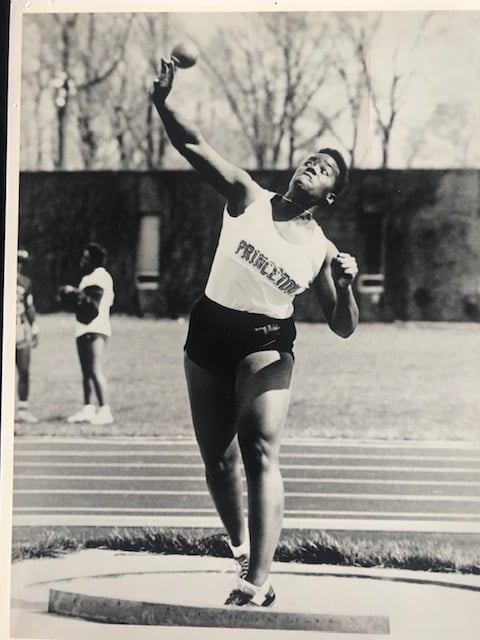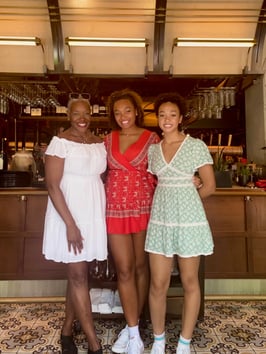What or who inspired you to pursue a path in physical medicine and rehabilitation?
My father, Glodys Saint-Phard, MD, was a practicing psychiatrist in Baton Rouge, La., while I was in medical school. He was consulting at a free-standing acute rehabilitation hospital there. He thought I might like this field and encouraged me to spend time with the young doctors there. I did. I took some electives at Temple University and my away rotation was here at the CU School of Medicine as a fourth-year medical student. I found my preferred field and my preferred place to do my residency here at CU Anschutz.
Why do you choose to pursue your goals at CU Anschutz?
There is a very high degree of collegiality amongst my peers at CU Anschutz. My peers have trained in the best academic institutions in the country and have decided to continue their pursuits here. We respect each other’s journeys and commitments to excellence for our patients.
What gets you out of bed in the morning? What is your WHY? Why do you do this work?
The work of showing up to represent the underrepresented minorities in medicine is a reason I get out of bed each morning. It is hard to be an “only” anything. I represent an intersection of “only”: lesbian, Haitian immigrant, single mom raising two biracial children of my biology, Olympian, Princeton University (Ivy League educated), All-American in track and field, award-winning athlete in soccer and shotput, world championship competitor in the shotput, and a Black woman. People look at me and see a person who is successful. Imposter syndrome is real.
 |
| Saint-Phard throwing shotput by Princeton University photographer, Robert Matthew circa 1987 |
This led me to obtain four different board specialties and subspecialties: to prove, to myself, that I am competent. This eventually also led to my burnout as a physician as each certification requires re-certification. The loss of my dad and sister in 2016 also hit me at a very basic human level that left me super sad. Losing track of the human side of being a person – not just a super-responsive physician to everyone else’s needs without regard for one’s own left me isolated and despondent. Learning about the epidemic of suicide of physicians led me to shift my work from stress fractures in athletes to the emotional stress fractures of physicians. In 2018, I put together a two-day course for physicians on physician burnout and strategies to help us regain our humanity and change the systems that contribute to our burnout and compassion fatigue.
The summer of 2020 shocked me in a way I had never been touched: Witnessing George Floyd’s execution by a white police officer made me realize, in an undeniable way, that no matter my successes, prestige or influence – nothing mattered other than the color of my Black skin. No security system, no luxury car, no exclusive memberships, nothing would keep me or my children safe in America. Creating community for BIPOC at CU Anschutz matters to me.
It’s lonely and important to keep showing up. I have held two fundraisers on my rooftop to try to give back without recreating wheels. We play cornhole and have maintained pandemic strategies while raising $18,000 in 2020 and $8,000 in 2021 for the Southern Poverty Law Center. I am now giving speeches about Failing Up, as I describe my life’s journey. It is a life of riches and challenges and a lot of instability. My desire to represent anyone who has ever been marginalized keeps me going, keeps me speaking up, keeps me watchful, keeps me helping.
My parents (both medical doctors in Haiti) told us that we all had the responsibility to help others who needed our help and whom we could speak for because my parents saw that we were natural leaders and charged us with the responsibility to look out for people with less power. I hope I am doing that: using my voice, presence and privilege to help. I feel blessed with many talents. My dad told us, “God has blessed you with very many talents, it is your responsibility to develop them.” Singing my favorite hymn helps when I am sad, lonely or tired. “Precious Lord” by Thomas Dorsey. And exercise makes me very happy; skiing and pickleball are super fun and super social. All these things make me feel engaged and very happy.
The celebration of Black History Month in February brings an opportunity to consider one’s impact and legacy. What kind of impact on history do you hope to make?
I hope that – after a 20-year run as faculty here on top of my three-year residency – I can make the case that this is a place where BIPOC can come, feel supported to pursue excellence and not be in isolation. I hope that my time here will represent that to others who consider training here or joining us from elsewhere. We need more BIPOC who are interested in pursuing excellence in medicine in a community of awesome, fun people who also don’t mind playing pickleball or hiking or skiing a mountain run or two.
What do you do to re-charge and re-inspire yourself when you feel depleted, or when you are working through a challenging situation?
Today, I awoke and started a 90-90 challenge: 90 minutes of accumulated exercise (yoga, stretching, PT exercises, skiing, running, walking) for the next 90 days. Just for fun. It is super easy to get complacent about one’s need for fitness and vigor. The benefits of exercise are tremendous for improved body composition as we age, improved mood, social engagement, and it’s just fun.
 Saint-Phard and her daughters Saint-Phard and her daughters |
Being with my two girls is super easy and wonderful. They know me pretty darn well. We have fun together playing backgammon, Sequence, watching their TikToks and skiing together. Watching my youngest daughter at her fencing tournaments is a real joy as she heads to the Junior Olympics in February in Salt Lake City. It’s neat to watch her develop into an elite athlete in a sport she enjoys so much. My oldest daughter is in her first year at Princeton University thinking about psychology, architecture and finance. I’m so proud of both of them.
As an introvert, it is critical that I spend time alone to re-charge. Mountain trips are awesome. Spending time with my girlfriend is awesome: talking about parenting, dinners together, lots of laughing, walking hand in hand, taking in the best of Colorado and international travel. We also talk about her sprint triathlons and training regimen, which inspired my 90-90 challenge.
During the pandemic, I joined a poetry group and learned to write limericks that can be really light and funny to pretty poignant in reflecting on the suffering of Black people as slaves, persecuted, and duped and still they rise and love God and their children and life regardless. It is important to show compassion and not prejudice to BIPOC. It is critical to think of the over 400-year history of slavery and oppression every time you see a Black person in America. Breonna Taylor’s slaying while she slept in her bed leaves me knowing that I am forever unsafe because I am a person of color in America. Imagine that that is how I feel every day. And, regardless, I go to work every day to render care to all. It is an additional invisible burden that is important for everyone to understand and is the Black experience, whether we speak of it or not. It is our shared experience. And I still pursue the excellence I am gifted to pursue in a place that I have loved and cherished since I was a visiting medical student in 1991: the CU School of Medicine.
Saint-Phard recites one of her poems that she wrote during the pandemic, reflecting on the Tulsa Race Massacre over 100 years later.



 Saint-Phard and her daughters
Saint-Phard and her daughters.png)

